Garam Masala Adventure
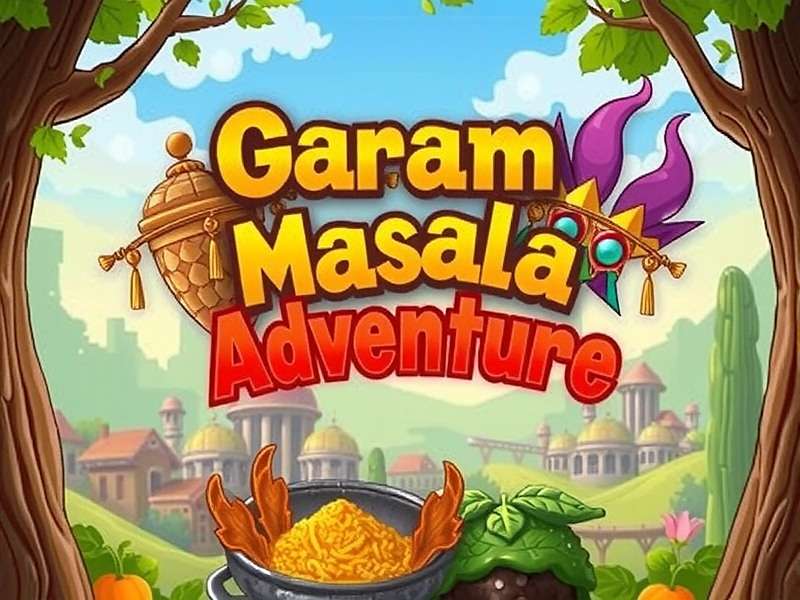
Garam Masala Adventure is India's most loved cooking and spice-themed mobile game, launched in 2022 by SpicePixel Studios, a Bangalore-based game development team. This game isn't just about cooking—it's a celebration of India's diverse culinary heritage, packed with adventure, strategy, and a whole lot of masala magic!
Imagine traveling from the street food stalls of Delhi to the coastal kitchens of Goa, from the royal palaces of Rajasthan to the village huts of West Bengal—all while collecting rare spices, mastering traditional recipes, and building your own culinary empire. That's exactly what Garam Masala Adventure offers to its millions of players across India.
What makes this game special? It's simple, yaar—every detail, from the spices to the music, from the NPCs (non-playable characters) to the festivals, feels uniquely Indian. Whether you're a 15-year-old in Chennai or a 45-year-old in Ludhiana, you'll find something that reminds you of your home, your mom's kitchen, or that favorite street food joint around the corner.
Overview
The story of Garam Masala Adventure starts in a small town in Uttar Pradesh, where our protagonist, Anjali, inherits her grandmother's old recipe book and a tiny spice shop. The book, however, is incomplete—its most precious pages, containing the secret family garam masala recipe, are missing!
Determined to restore the recipe and honor her grandmother's legacy, Anjali sets off on a journey across India. From the backwaters of Kerala to the mountains of Himachal Pradesh, she meets local chefs, farmers, and grandmothers who share their knowledge, spices, and stories. Along the way, she faces challenges like spice smugglers, unpredictable weather that ruins crops, and cooking competitions that test her skills to the limit.
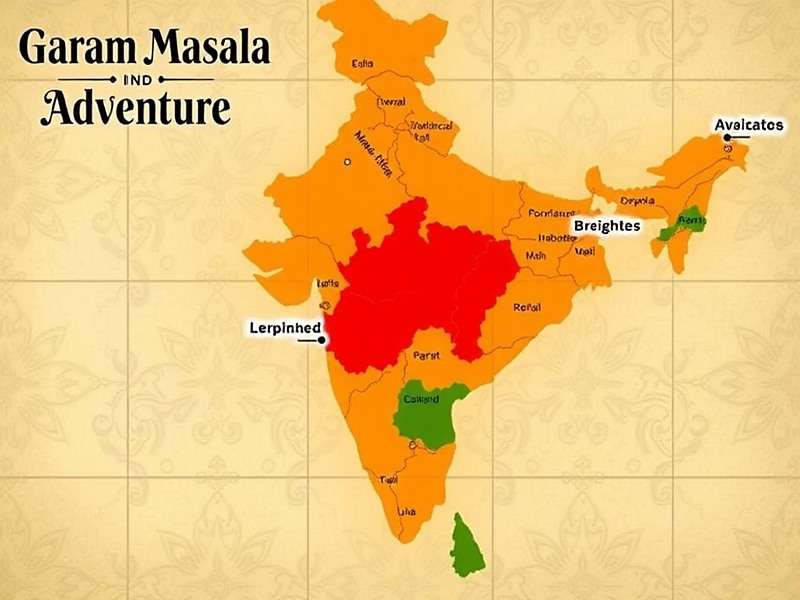
Developed using the Unity engine, the game features vibrant 3D graphics that make each region's landscapes and kitchens come alive. The sound design is equally impressive—you'll hear the chatter of local markets, the sizzle of spices in hot oil, and regional music that changes as you move from state to state. It's like taking a virtual food tour of India, but with more fun and challenges!
One of the game's biggest strengths is its educational value. While playing, you'll learn about the history of spices like cardamom (which came to India via the Silk Road), the medicinal properties of turmeric (used in Ayurveda for centuries), and why certain regions prefer specific spices—like how coastal areas use more coconut and curry leaves, while North India favors cumin and coriander.
Gameplay Mechanics
Core Gameplay Loop
At its heart, Garam Masala Adventure is a mix of cooking simulation, spice collection, and adventure. Here's how it works, bhai:
🌶️ Collect Spices: Travel to different Indian states to find and collect spices. Some are common (like turmeric, cumin), others are rare (like saffron from Kashmir, black pepper from Kerala), and a few are legendary (like the "Royal Clove" from Karnataka, which only appears during monsoons).
👩🍳 Cook Dishes: Use your spices to cook traditional recipes from each region. Follow the steps carefully—chop ingredients, control heat, add spices in the right order—to make perfect dishes. The better the dish, the more coins ("Masala Money") you earn!
🏪 Manage Your Shop: Sell your cooked dishes in your shop to earn money. Upgrade your shop to attract more customers, add seating, or hire helpers (like a chaiwala or a cleaner) to manage the rush during festivals.
🧩 Solve Culinary Puzzles: Each region has unique puzzles. In Punjab, you might need to sort different types of lentils to unlock a secret recipe. In Bengal, you'll have to match spices to the right sweets (rasgulla needs cardamom, not chili—obviously!).
🗣️ Interact with NPCs: Talk to local characters—grandmothers who share secret tips, farmers who sell rare spices at discount, or food critics who can make or break your reputation. Building good relationships unlocks special rewards!
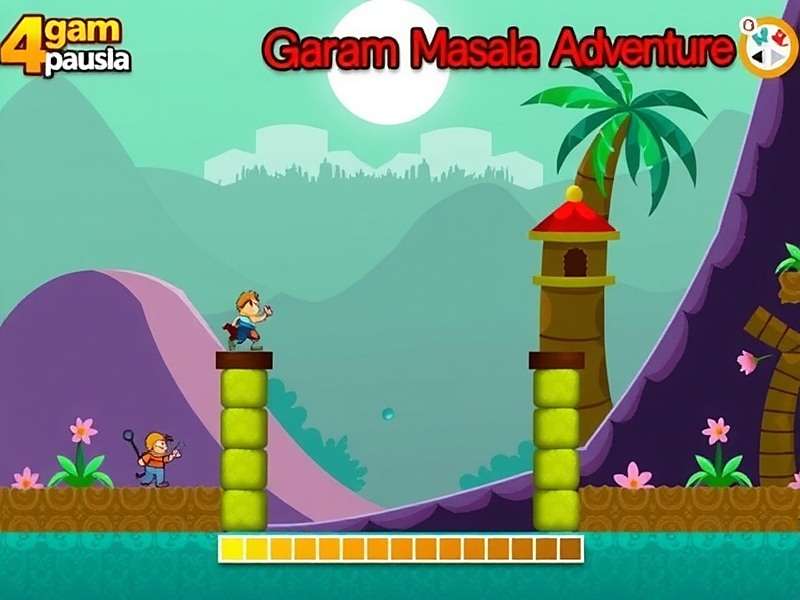
Spice System & Rarity
Spices are the heart of Garam Masala Adventure, and the game has over 50 types, each with its own properties. Let's break down the rarity system:
🔹 Common Spices: Found everywhere—turmeric, cumin, coriander, red chili. These form the base of most recipes. You can buy them from any market, but it's cheaper to collect them from local farms.
🔹 Uncommon Spices: Region-specific but not too hard to find—like fenugreek in Punjab, curry leaves in Tamil Nadu, or mustard seeds in Bengal. You'll need to visit specific states or complete small quests to get them.
🔹 Rare Spices: These are tricky! Saffron from Kashmir only grows in winter, and you need to help local farmers protect their crops from snowstorms to get it. Black cardamom from Sikkim is guarded by a puzzle where you have to identify fake vs real cardamoms.
🔹 Legendary Spices: There are only 7 of these, and each has a unique story. The "Mysore Masala" blend, for example, can only be obtained by winning the annual "Dosa Competition" in Karnataka during Dussehra. These spices make your dishes 10x more valuable and are the key to completing Anjali's recipe book.
Each spice also has a "freshness" meter—spices go bad over time, so you need to store them properly. Investing in a "spice storage box" (which you can buy with Masala Money) keeps them fresh longer. Pro tip: Grandmothers in the game often give free storage upgrades if you listen to their stories!
Multiplayer & Social Features
Garam Masala Adventure isn't a solo journey—you can team up with friends and other players through the "Culinary Collective" feature. Here's what you can do together:
👨👩👧👦 Form a Collective: Create or join a group of up to 50 players. Collectives have their own "community kitchen" where members can pool spices and cook large batches of dishes for special events.
🏆 Compete in Cook-Offs: Every weekend, collectives compete against each other in regional cook-offs. For example, a North vs South challenge where North makes butter chicken and South makes Chettinad chicken. The winning collective gets rare spices and a special badge.
🎁 Spice Sharing: Need a rare spice for a recipe? Ask your collective members to lend you some. Just remember to return the favor—karma matters in the game, yaar!
💬 Recipe Exchange: Share your best recipes with the collective. The more unique recipes your group has, the higher your collective's reputation, which unlocks exclusive events.
Many players say the social part is their favorite. "My collective has members from all over India," says Rakesh from Ahmedabad. "A guy from Kerala taught me how to make proper fish curry, and I taught him to make dhokla. Now we win most cook-offs together!"
Localized Versions & Regional Flavors
One of the reasons Garam Masala Adventure is so popular across India is its attention to regional details. The game offers 14 language versions, including all major Indian languages plus English. Let's see how it adapts to different regions:
🌍 Language Preferences (as of 2025):
Hindi: 38% of players
English: 25% of players
Tamil: 12% of players
Telugu: 9% of players
Bengali: 7% of players
Marathi: 5% of players
Other languages: 4%
But it's not just about language—each region gets unique content that feels like home:
North India (Punjab, Haryana, Uttar Pradesh):
• NPCs wear kurta-pajamas and salwar kameez, and greet you with "Sat Sri Akal" or "Namaste".
• Special dishes: Butter chicken, chole bhature, gulab jamun. The "tandoor mini-game" is super popular here—cook naan bread by controlling the tandoor's heat.
• Music: Bhangra beats and harmonium tunes. During Lohri, the game plays "Sunder Mundriye" and you get to cook rewri and gajak.
South India (Tamil Nadu, Kerala, Karnataka):
• NPCs wear mundus and sarees, and use greetings like "Vanakkam" and "Namaskara".
• Special dishes: Dosa, idli, sambar, biryani (Kerala style with coconut milk). The "rice grinding mini-game" lets you grind rice for idlis—timing is everything!
• Music: Carnatic instruments like mridangam and veena. Pongal brings special events where you cook sweet pongal and compete in "jallikattu-style" bull races (but with spices, not bulls!)
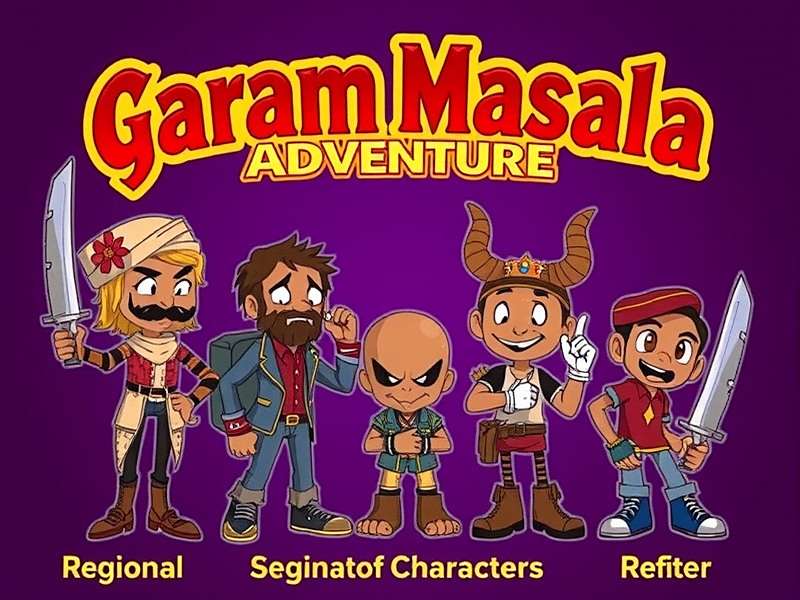
East India (Bengal, Odisha, Assam):
• NPCs wear dhoti-kurtas and Bengali sarees, with greetings like "Nomoshkar".
• Special dishes: Rasgulla, macher jhol (fish curry), pitha. The "mustard grinding mini-game" is crucial here—Bengali curries need fresh mustard paste!
• Music: Baul songs and Rabindra Sangeet. Durga Puja is a big event—decorate your shop with durga idols and cook special prasad like khichdi.
West India (Maharashtra, Gujarat, Rajasthan):
• NPCs wear bandhani turbans and chaniya cholis, greeting with "Kem cho" or "Namaskar".
• Special dishes: Dhokla, vada pav, dal baati churma. The "spice roasting mini-game" is key for Rajasthani dishes—roast spices just right to get that smoky flavor.
• Music: Garba and dandiya beats. During Navratri, you can play garba in your shop to attract more customers and earn bonus coins.
Players love these regional touches. "When I saw the vada pav stall in the Mumbai level, I felt like I was back home," says Priya from Pune. "The game even got the chutney right—green chutney with garlic, not too spicy. That's attention to detail!"
Downloads & Availability
Garam Masala Adventure is available for free on both Android and iOS, with optional in-app purchases (like special spice storage or festival costumes for Anjali). Since its launch in July 2022, it's become a massive hit across India—here are the numbers as of October 2025:
📊 Download & User Stats:
Total downloads in India: 12.3 million
Google Play Store: 9.7 million downloads
Apple App Store: 2.6 million downloads
Daily active users (DAU): 2.1 million
Monthly active users (MAU): 5.8 million
Average time spent per day: 42 minutes
Top 5 states by players: Maharashtra, Tamil Nadu, Uttar Pradesh, Karnataka, West Bengal
Most popular age group: 18-35 years (62% of players)
📥 Download Garam Masala Adventure Now
What's great about the game is that it works well even on low-end Android phones—perfect for India's mobile market. It only needs Android 7.0 or higher (or iOS 12.0 or later) and takes up just 180MB of storage. You don't need a high-speed internet connection either—most of the game can be played offline, with only events and multiplayer features requiring data.
The developers have also optimized it for regional networks. "I play on my old Redmi phone in a village in Bihar," says Raju, a regular player. "It never lags, even when I'm in a busy market area in the game. And the offline mode is a lifesaver when my data runs out!"
In-app purchases are totally optional, and the game is designed so that you can progress without spending real money. Most players buy things like "spice boosters" (which make spices last longer) or special festival outfits for Anjali, but these are just for fun, not necessary to win.
Player Reviews & Ratings
Garam Masala Adventure has received amazing feedback from Indian players. On Google Play, it has a 4.7-star rating from over 200,000 reviews, and on the App Store, it's 4.8 stars from 55,000+ reviews. Let's look at what players are saying:
Positive Reviews:
"This game feels like a warm hug from my dadi (grandma)! The way they've captured Bengali cooking—especially the way we grind mustard in a sil batta (stone grinder)—brings back so many memories. My 7-year-old daughter now asks me to teach her to cook because of this game. 5 stars, no doubt!" — Soma, 36, Kolkata
"Finally, a game that shows India beyond just Bollywood! I'm from Gujarat, and the dhokla-making mini-game is spot on—you even have to let it ferment properly. The multiplayer cook-offs with my friends from different states are so much fun. We argue about which region's food is best, but in a friendly way!" — Jay, 24, Ahmedabad
"As someone who left India for the US, this game keeps me connected to home. The spices, the music, the festivals—it's like a little piece of India in my phone. I've learned so many recipes I can now make for my American friends. Thank you, Garam Masala Adventure!" — Vikram, 31, California (Indian expat)
Constructive Feedback:
"I love the game, but I wish there was more content for Northeast India. We have amazing spices like bhut jolokia (ghost pepper) in Assam, but they're barely featured. Hope the developers add more soon!" — Nisha, 29, Guwahati
"The server gets crowded during Diwali events, and sometimes my dishes burn while waiting. Maybe add more servers during big festivals? Otherwise, it's perfect!" — Arun, 27, Chennai
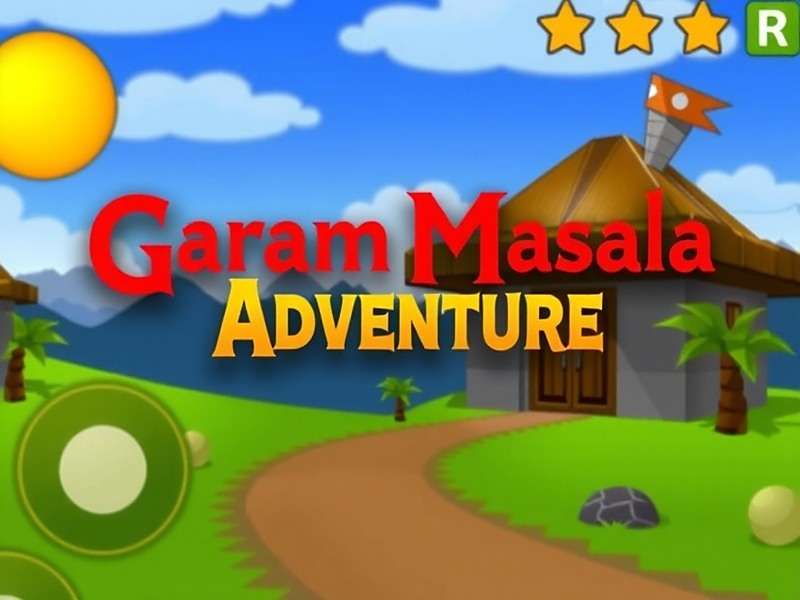
The developers are great at listening to feedback. They've already added more Northeast content in 2024, including a Bihu festival event and Assamese laksa recipes. They also increased server capacity during major festivals after players complained about lag.
Critics have praised the game too. The Indian Gaming Awards named it "Best Cultural Game" in 2023 and 2024. A review in "Tech India Magazine" said, "Garam Masala Adventure does something rare—it entertains while educating players about India's culinary diversity. It's not just a game; it's a cultural experience."
Indian Player Guides & Pro Tips
Indian players have come up with some clever strategies to master Garam Masala Adventure. Here are the best tips from the community, passed down like secret family recipes!
Beginner's Guide: Start Your Culinary Journey
1. Master the basics first: Focus on cooking simple dishes like dal and rice until you get the hang of the cooking mechanics. These dishes sell quickly and give you steady Masala Money to invest in better equipment.
2. Visit the market daily: Spice prices change every day—like how tomatoes get expensive before Holi! Check the market each morning to buy spices when they're cheap and sell your dishes when demand is high.
3. Talk to every grandma: In the game, grandmothers (called "dadi ma" or "ajji") give the best tips. They'll tell you when rare spices will be available or which dishes will be popular that week. Always take the time to chat with them—they never lie!
4. Complete daily quests: These are small tasks like "cook 3 chapatis" or "collect 5 turmeric". They're easy and give you "Spice Points" which you can use to upgrade your kitchen tools. Even 10 minutes a day doing quests will help you progress fast.
5. Don't ignore storage: Spices go bad, especially in hot weather (in-game and real life!). Upgrade your spice box early to keep spices fresh longer. Trust me, you don't want to waste rare saffron because it spoiled!
Advanced Strategies: Become a Culinary Master
1. Time your cooking with real festivals: The game increases prices for festival-specific dishes. For example, make lots of gulab jamun before Diwali, or pongal before the Pongal festival—you'll earn 2x more Masala Money!
2. Specialize in regional dishes: Pick one region and master its recipes. If you focus on South Indian dishes, you'll get better at the dosa mini-game, which means you can cook faster and earn more. Then trade with players who specialize in other regions.
3. Use the weather to your advantage: The game has dynamic weather—monsoons in Kerala make black pepper more valuable, while winter in Kashmir boosts saffron prices. Plan your spice collection trips around the weather forecast (you can check it in the game's "local news" section).
4. Form a diverse collective: Join a collective with members from different states. A Punjabi player can help with north Indian spices, a Tamil player with south Indian recipes—this way, your group can cook any dish and win more competitions.
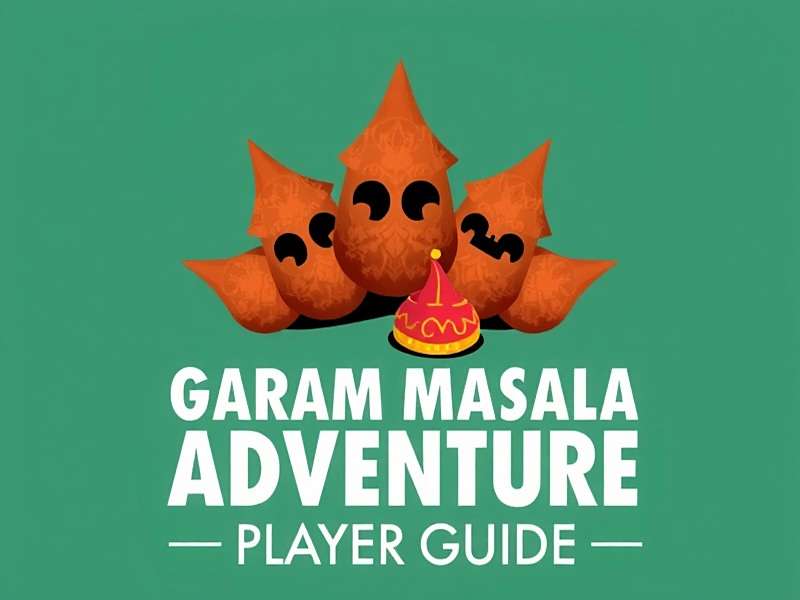
Secret Tips from Top Players (Shhh...)
• "If you visit the same farmer every day for a week, they'll give you a 30% discount on spices. I found this out after talking to a farmer in Punjab for 10 days straight—worth it!" — Mohan, top 50 player from Amritsar
• "The 'spice fusion' mini-game has hidden combinations. Try mixing cinnamon (from Himachal) with cardamom (from Kerala)—it makes a 'royal blend' that sells for 5x the price! I accidentally discovered this while making biryani." — Ayesha, spice trading champion
• "During full moons, legendary spices are more likely to appear. I always plan my rare spice hunts around the moon calendar in the game. Last month, I found 3 legendary spices in one night!" — Deepak, 3-time cook-off winner
• "NPC food critics have favorite dishes—if you serve them their favorite, they'll give you a 5-star rating, which brings more customers. The Mumbai critic loves vada pav, the Delhi one loves butter chicken—figure these out and your shop will be packed!" — Sneha, shop management pro
Localized Events & Festival Celebrations
Garam Masala Adventure truly shines during Indian festivals, with events that make the game feel like a celebration. These events are free to join and offer exclusive rewards you can't get otherwise. Let's look at the biggest ones:
Major Annual Events
Diwali Spice Festival (October/November):
This 15-day event is the biggest of the year! The game world lights up with diyas and rangolis, and you can cook special Diwali sweets like laddoo, barfi, and jalebi. The main attraction is the "Rangoli Cooking Challenge"—decorate your dishes with edible rangoli patterns using colored spices (like turmeric for yellow, beetroot powder for red).
Rewards include a "Golden Spoon" tool that never burns food, and a special "Diwali Masala" blend that makes any dish 3x more valuable. Players also get to decorate their shops with fairy lights and diyas, which attract VIP customers.
Holi Food Fiesta (March):
Holi in the game is all about color and flavor! You can throw colored powder (gulal) at NPCs to get rare spices, and cook traditional Holi dishes like gujiya, mathri, and thandai. The "Color Mixing Mini-Game" lets you create unique spice colors to decorate your dishes—win this, and you get a "Rainbow Spice Box" that keeps all spices fresh forever.
A fun tradition: players send "virtual gujiyas" to their collective members, which gives both players bonus coins. It's like sharing sweets with friends in real life!
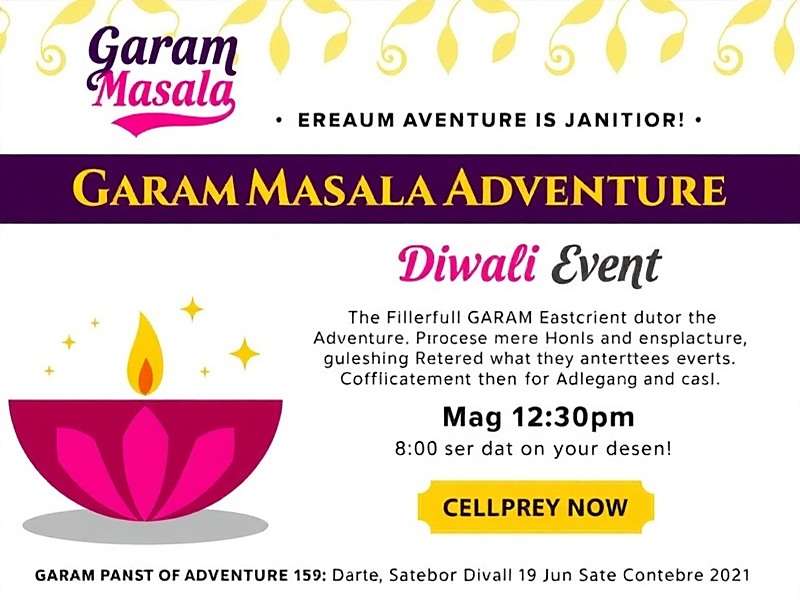
Pongal Harvest Festival (January):
Celebrated in the South Indian regions of the game, this 4-day event focuses on harvest and gratitude. You can cook sweet pongal (with jaggery and rice) and savory pongal, and participate in "bull race" mini-games (where you guide a bull to collect spices). The winner gets a "Harvest King" title and a year's supply of rare rice spices.
Players also get to decorate their shops with sugarcane and banana leaves, and NPC farmers give extra spices as thanks for celebrating their harvest.
Raksha Bandhan Special (August):
This heartwarming event lets you tie virtual rakhis to NPCs and collective members. In return, they give you rare spices and "Protection Charms" that prevent your spices from spoiling. You can also cook special raksha bandhan sweets like kheer and peda, which sell for high prices.
Many players use this event to strengthen bonds in their collectives—tying a rakhi to a member gives both of you a 24-hour bonus in cooking speed!
Monthly Regional Events
Every month, a different Indian state is in the spotlight, with events showcasing its unique cuisine. Here's a sneak peek:
• January: Kerala—focus on seafood curries and coconut-based spices. Event: "Backwater Spice Hunt" where you collect spices while boating through backwaters.
• February: Punjab—all about butter chicken, naan, and Punjabi spices. Event: "Tandoor Challenge" to cook the perfect naan.
• March: Rajasthan—focus on dal baati and desert spices like dried mango. Event: "Desert Spice Trek" where you find spices in sand dunes.
• April: West Bengal—Bengali sweets and fish curries. Event: "Poila Boishakh Feast" to celebrate Bengali New Year.
• May: Gujarat—dhokla, fafda, and jalebi. Event: "Navratri Prep" where you cook for the upcoming festival.
And so on, covering all 28 states! These regional events are a hit because they let players explore parts of India they've never visited. "I've never been to Kerala, but the January event made me want to visit—those backwaters and seafood curries look amazing!" says Ritu from Delhi.
Community & Cultural Impact
The Garam Masala Adventure community is more than just gamers—it's a group of people who love Indian food and culture. Let's see how players connect, both online and offline:
Popular Community Platforms
• Facebook Groups: There are over 800,000 members across regional groups like "Garam Masala Tamil Players" and "Hindi Garam Masala Chefs". These groups share recipe tips, organize collective sign-ups, and even plan real-life meetups.
• WhatsApp Groups: Smaller and more active—most local groups have 50-300 members from the same city. They coordinate daily spice trades,提醒 each other about event deadlines, and share photos of real dishes they've cooked inspired by the game.
• Reddit: The r/GaramMasalaAdventure subreddit has 180,000+ members. Here, players post攻略, discuss updates, and share funny stories—like the time a player accidentally used chili instead of cardamom in a rasgulla recipe and "ruined" their in-game reputation.
• In-Game Chat: The game's chat feature is always buzzing—players share real-time tips during events, congratulate each other on winning cook-offs, and even arrange "virtual feasts" where everyone cooks a different dish and shares screenshots.
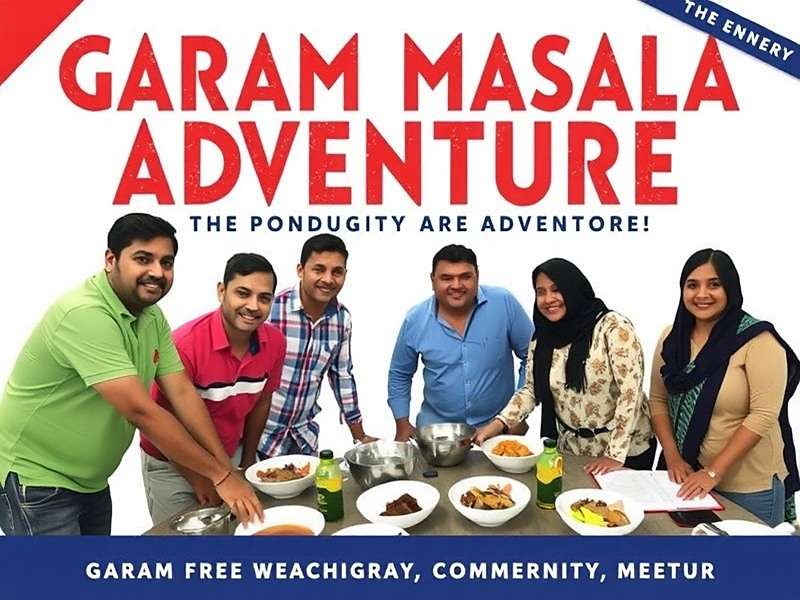
Real-Life Community Traditions
The game has inspired some wonderful real-world traditions among Indian players:
• "Masala Meetups": Players from the same city gather in parks or community halls to play the game together, but also to cook real dishes from the game. In Bangalore, over 200 players meet every month for a "Potluck Challenge"—everyone brings a dish from the game, and they vote on which one tastes best.
• "Generational Gaming": Many families play together. Kids teach their parents how to use the app, and parents teach their kids about real spices and cooking. "My 10-year-old son plays the game, and now he asks me to teach him how to make the dal makhani he cooks in the game," says Meera from Hyderabad. "It's brought us closer!"
• "Spice Charities": Some collectives organize real-life charity events. For example, the "Delhi Spice Collective" raised money to buy spices for local orphanages, and the developers matched their donation. Players say it feels good to "give back" using a game they love.
• "Cooking Competitions": Inspired by the in-game cook-offs, many communities host real cooking competitions. Last year, Chennai held a "Garam Masala Challenge" where 50 players competed to make the best dosa, judged by a local chef. The winner got a year's supply of spices and a special in-game badge.
The game's impact goes beyond entertainment. A survey by the Indian Food Foundation found that 63% of players have tried cooking a new Indian dish after playing Garam Masala Adventure, and 41% said they now know more about spices from other regions. "I never knew Assam had such amazing spices until I played this game," says Gaurav from Pune. "Now I order bhut jolokia online and use it in my curries—spicy, but delicious!"
Future Updates & Roadmap
The developers of Garam Masala Adventure have big plans for the next year, based on player feedback. Here's what's coming up:
• Northeast India Expansion: By early 2026, the game will add 5 new Northeast states, including Assam, Meghalaya, and Nagaland. Players will collect spices like bhut jolokia (ghost pepper), king chili, and wild ginger, and cook dishes like Assamese laksa and Nagamese pork curry. There will also be Bihu and Hornbill Festival events.
• Chef Collaborations: The game will partner with famous Indian chefs like Sanjeev Kapoor and Madhur Jaffrey to add their signature recipes. Players can learn to cook these recipes in-game, with step-by-step instructions from the chefs themselves. Cooking these recipes will give special rewards, and there might even be virtual cooking classes with the chefs!
• Multiplayer Kitchens: A new feature where 4-5 players can cook together in the same virtual kitchen. You'll need to coordinate—one chops, one cooks, one adds spices—to make complex dishes like biryani or wedding feasts. This is perfect for friends or family playing together.
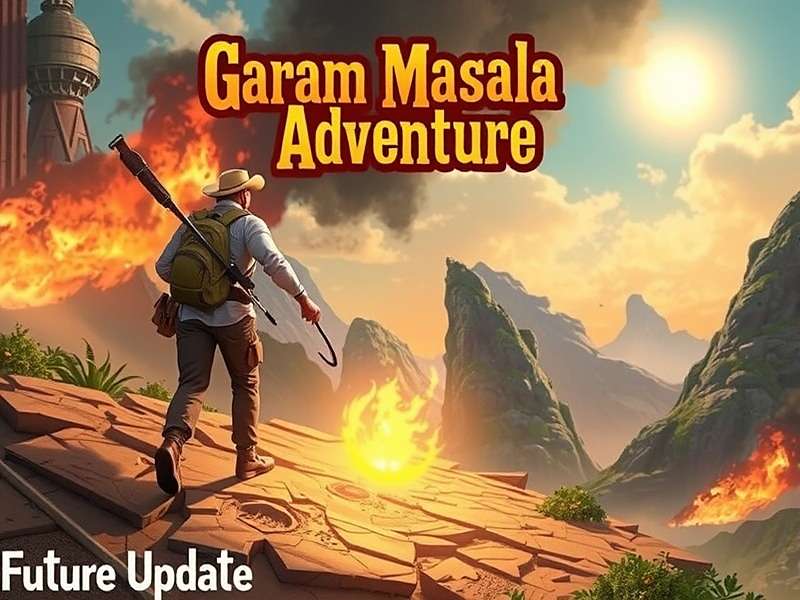
• VR Support: For high-end phones and VR headsets, you'll be able to "step into" your virtual kitchen. Imagine chopping virtual onions (without crying!) or stirring a curry in a virtual kadhai—this will make the cooking experience even more realistic.
• Spice Farming: Players will get their own spice farms, where they can grow spices from seeds. You'll need to water them, protect them from pests, and harvest at the right time. Growing your own spices will be cheaper than buying them, and you can sell extra to other players.
• Indian Street Food Expansion: More focus on street food from across India—vada pav from Mumbai, pani puri from Delhi, kathi rolls from Kolkata, and more. There will be a "Street Food Stall" mode where you can set up your own stall and compete with NPC street vendors.
Players are super excited about these updates. "I can't wait for the Northeast expansion—I'm from Meghalaya, and it's great to see our spices getting recognition," says Andrew. "And cooking with Sanjeev Kapoor? That's a dream come true for any Indian food lover!"
Login & Account Management
Creating an account for Garam Masala Adventure is easy and lets you sync your progress across devices, join collectives, and participate in events. Here's how to get started:
🔐 Login to Your Garam Masala Adventure Account
You can log in using: • Google account (most popular among Indian players) • Apple ID (for iOS users) • Facebook account • Local phone number (no email needed!) — this is a favorite feature in rural areas where email usage is low.
The game also offers a "Guest Mode" if you want to try it before creating an account. But remember—if you clear your phone data, you'll lose your progress in Guest Mode. It's better to create an account early, even if it's just with your phone number.
Account security is important, and the game lets you set a 4-digit PIN for quick login, which is easier than remembering passwords. You can also link multiple devices to your account, so you can play on your phone during the day and on your tablet at night without losing progress.
For parents, there's a "Kids Mode" that limits in-app purchases and screen time. You can set a time limit (like 30 minutes a day) and turn off all purchases, so your kids can enjoy the game safely.
Conclusion
Garam Masala Adventure is more than just a mobile game—it's a love letter to India's culinary diversity. It brings together people from different states, ages, and backgrounds through a shared love of food and spices.
What makes it special is its authenticity. The developers didn't just add "Indian elements" as an afterthought—they worked with chefs, historians, and people from different regions to make sure every spice, recipe, and festival feels true to life. It's a game that teaches you about India while entertaining you, and that's a rare thing.
Whether you're a seasoned cook or someone who can barely boil water, there's something for you. You can play casually for 10 minutes a day, or dive deep into the strategy of spice trading and cook-offs. Either way, you'll come away with a greater appreciation for India's rich food culture.
With over 12 million downloads and a growing community, Garam Masala Adventure has proven that Indian games with Indian themes can be huge hits. It's paved the way for more culturally focused games from India, and that's something to celebrate.
So what are you waiting for? Download the game, start your spice collection, and join millions of Indian players on a culinary adventure like no other. Who knows—you might just become the next great Indian chef, both in the game and in real life!
This game is recommended by daman games. To discover more quality Indian games, please visit daman games.